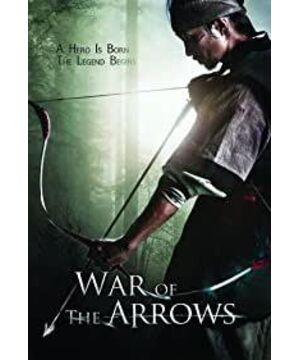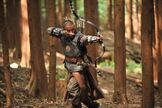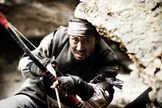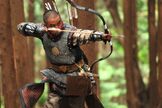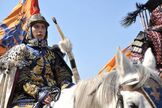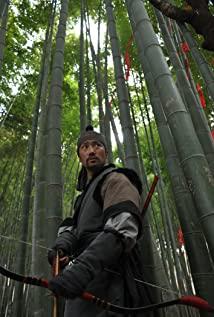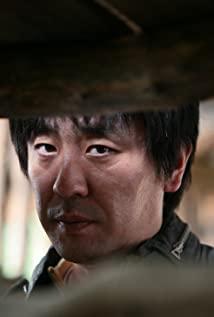Because of the dangerous mountains on the Korean peninsula, countries on the peninsula have naturally developed the tactics of relying on the mountains to shoot arrows to defend the city, and the Korean bows and arrows have naturally developed along with it.
However, despite being such an important bow and arrow, the treatment of bows and arrows in costume films has not been very good. They are always in the shadow of swords and have never been the protagonist. Because first of all, bows and arrows are not as handsome as swords, and the shooting is relatively more difficult. If the shooting is not good, it can give people the frustration of the tribe and the indigenous people to shoot their arrows and hunt. For the bows and arrows in the movie, what impressed me the most was the "hero", who had been infamous by Chinese audiences. The impact on Qin Chao's portrayal of arrows was unprecedented. Of course, the hero's protagonist weapon is still swords and guns after all.
Now, "Final Weapon Bow" takes the bow and arrow as the theme, and I want to give it back to the title. Everything in the film also revolves around bows and arrows.
But the title "Final Weapon Bow" makes people very speechless. The title of such a sci-fi and comics, the final weapon, The Girl, is placed on a serious costume film, which is totally out of touch. It may be changed for the convenience of publicity, because the original title of the film was
In fact, his bow is a bow for his family to live. This is what the film wants to say. , Very simple and clear.
The story of the film is also very simple, there is nothing to say about the plot, but the influence of Bingzi's disorder on North Korea is worth talking about.
The most amazing thing about Bingzi’s chaos is the population gap between the two sides. At that time, the population of North Korea was about 11 million people. On the other hand, the Jurchen tribe was only 500,000. The Hans in the Qing army were about 500,000. Adding the Mongolians, the captives, and the inferiors, the total was no more than 2 million. It is peculiar that North Korea is unilaterally ravaged by such a huge population gap. The representative battle was the Battle of Shuangling, where the Qing Dynasty’s 300 cavalry broke through the 40,000 defenders of Korea.
At first, North Korea looked down upon the Jurchen tribe and regarded the Ming Dynasty as the kingdom of heaven. However, the fifteenth king of Joseon Gwanghae promoted neutral diplomacy and maintained friendly relations with both Ming Dynasty and Houjin. And this neutral policy made the ministers yearning for the Ming dynasty unbearable, and even the northern ministers who supported King Gwanghae could not accept this, because everyone was a Confucian student.
"Hu Ren is at war with Big Brother, why should we watch the fire from the other side."
So, this directly became Renzu's righteous name for abolishing King Gwanghae.
This concept of Chinese worship prevailing in North Korea is due to the fact that North Korea is a country in the Confucian Chinese character cultural circle, and second is the yearning for an advanced cultural power. Therefore, North Korea’s worship of China is emotionally strong.
After Injo ascended to the throne, North Korea changed its course and began to implement a policy of pro-ming and exclusion of gold. North Korea actively assisted the Ming army to requisition Liaodong, making Jin feel that it is difficult to fight, and it is necessary to conquer North Korea to eliminate the troubles.
Therefore, Houjin Sanwan set out to conquer North Korea with the title of "revenge for the abolished former Joseon King Gwanghae-kun" and defeated Injo. After the victory, the requirement was that the Ming Dynasty's reign name "Apocalypse" should no longer be used, and the two countries of North Korea and Jin Dynasty formed an alliance as a brother country, and then withdrew. This was an event in 1627, called Dingmao Random.
Later, after Houjin changed its name to the Qing Dynasty, he demanded to amend the relationship between the two countries, from a brother to a monarch, and asked North Korea to pay tribute to himself. North Korea became angry. The low-ranking Hu people claimed to be the celestial dynasty. It is shameful to form an alliance with the Hu people. Now they have to recognize the Lord. This cannot be agreed. hit!
Unexpectedly, the preparatory edict was intercepted by the envoy of the Qing Dynasty. As a result, as soon as it froze in the winter, the 100,000 Qing troops composed of the Manchu, Han and Mongolian tribes crossed the river directly, and went directly southward. They were very fast and arrived in Seoul within ten days. This was in 1636.
Therefore, although it seems unreasonable for the North Korean people to hold the wedding happily when the Qing soldiers invaded, it is also excusable. The Qing soldiers were too fast, and because of the Japanese Rebellion and the uprising, there were no reliable troops guarding the Qing soldiers' marching route, so everyone had lost before they could react.
The Qing soldiers plundered once when they attacked, detoured when they came out, and plundered again... there were half a million civilians captured. After North Korea was raped, it still had to pay tribute. This was Bingzi Random Rebellion, which ended in 1637.
The saddest thing is that the Jurchens used to pay tribute to North Korea.
However, if you look closely at Bingzi’s chaos, North Korea’s ravages in the general environment does not mean that all local wars have also failed. For example, in the siege of Namhansanseong, the Qing army used the Dutch red artillery to attack the city. The sky gun sniper exploded the cannon, which is very exciting.
And the Qing army also paid a small price, and several generals such as the Qing Taizong's Ma Yang Guli were sniped and killed by muskets. This section of detail, I believe it has become the prototype of the prince being killed in the film. But the prince's name was set as the famous Dorgon, I don't know what the director thinks.
If a Dingmao messed up, he had to make a brother agreement with the Huren, and his subordinates became brothers. If another Bingzi messed up, they became the boss. After being attacked by people, they had to pay tribute to others... the Korean people at that time Suffered from mental shock. Moreover, another impact of this incident was that North Korea was forced to sever ties with the Ming Dynasty, which had been in contact since the founding of the country, and recognized the Qing Dynasty as a heavenly country. Being a subject of the Ming Dynasty (state of vassal state) is beneficial to North Korea. Because North Korea implements external kings and internal emperors, being a subject country does not affect its internal governance, and it can also receive assistance from the Ming Dynasty when there are external invasions and internal disturbances, such as the Imjin Japanese Rebellion. If you pay tribute to the Ming Dynasty, the Ming Dynasty will also give it, which will be more than the amount of tribute, and it will also have the function of special product exchange. This is called "tribute trade." Therefore, the relationship between North Korea and the Ming Dynasty is also very good. North Korea originally worshiped the Ming Dynasty and gained benefits, while the Ming Dynasty gained face and stability.
Even North Korea sent envoys to pay tribute to the Ming Dynasty when it was idle all year round. The Ming Dynasty had to bite the bullet and give it to the Ming Dynasty. It was a headache for the Ming Dynasty. Later, North Korea was asked not to pay tribute too frequently.
However, to pay tribute to the Qing Dynasty, the Qing Dynasty did not pay attention to these, and there were not many gifts. The tribute materials and treasures were astronomical, which was three times that of the Ming Dynasty. Of course, those taxes were borne by the North Korean people. It was not until the Qing Dynasty entered the customs that the tribute became normalized, and it was not much different from the Ming Dynasty.
After North Korea was conquered, it did not convince the Qing dynasty from the bottom of his heart. For
example, it used to send envoys to the Ming dynasty called Chaotian to worship the emperor and introduce advanced civilization. Later, when he sent envoys to the Qing Dynasty, he was relegated to "Yanxing" (Yanjing's Yan) to see how the Hu people developed so powerfully, and learn some advanced things. The mentality is different.
After Xiaozong came to the throne, the call for "Northern Expedition" also became louder, because North Korea believed that even though the Manchus entered the Central Plains, they were not orthodox civilizations, but barbaric civilizations, and only inherited Han and Tang cultures can be orthodox civilizations. Naturally, the name of the Northern Expedition was also to "drive out the Hu people, avenge the Ming Dynasty, and restore China", which shows how much China means to the Korean Confucians. Of course, the Northern Expedition was not realized at all, and the feasibility was almost zero.
In summary, although the Rat casually during the Ming Dynasty Korea is standing over there,
but not familiar with the history of people will tend to emotionally in the Qing Dynasty,
after all, is a Qing dynasty in China, so look Synopsis It's normal to say that Koreans are obscene.
Most of the half a million North Korean refugees who were captured to Manchuria by the Qing Dynasty failed to return to North Korea. At the end of the film, the subtitles said that "the North Korean government did not make any effort for the return of these captured refugees." In fact, this is a big fallacy, and the subtitle itself is superfluous.
After the war, a ransom was required to redeem the refugees. The rich were fine, but the civilians had no choice. Therefore, the North Korean government also specially set aside a budget and related persons in charge to redeem poor refugees in Manchuria. Of course, it can only be a part of the people. After all, North Korea has limited financial resources.
The above is the general situation of Bingzi's indiscretion. In terms of historical research, I don’t know how to speak Manchu and I have not studied it. I feel that Manchu accent should be close to the current Mandarin in theory, so although the Manchu in the film is better, I still feel that the accent is not enough. Kung Fu... This is just a personal feeling and requires specific testimony from relevant Manchu researchers. Of course, being able to do this is already very powerful, and Liu Chenglong's Manchu language is very ecstasy.
In the textual research of bows and arrows, the unique "pian arrows" of North Korean bows and arrows are also convincingly restored. Blade arrows are much smaller than ordinary arrows, so they have strong penetrating power and are suitable for long-distance shooting. When launching, you need to use a bucket made of bamboo poles as a supplementary prop. After putting the blade in the bucket, you can shoot it. At this time, the bucket will stay. next to my hand.
Although it was the first time I saw and heard about the Liuliangya of Qingfang, it was also very shocking. The huge arrows and immense power are very feminine.
The regrettable part is that guns have already appeared in Bingzi’s random campaign, but the film does not mention the existence of guns at all. The bow as a cold weapon and the gun as a modern weapon will appear on the same stage. It will be a big attraction, and it can also better dig out the deep meaning of bows and arrows and other things. Another flaw is the budget problem. It is hard to imagine that the chase scenes actually took place in Manchuria, and the fatal thing is that there is no horse-shooting battle.
What is commendable is that although it is a Korean movie based on national history, the film does not favor nationalism or patriotism, and it follows the line of small people in the larger environment. And Ju Shindae, played by Yoo Seung-ryong, also has the same weight as the protagonist, and the light also overshadowed Anan, played by Park Hae-il, and is an actor worthy of attention.
In the film, Zhu Xinda, played by Liu Chenglong, told the Nilus, “Their bows are the same root as ours. So we can’t underestimate it.” The
fierce Jurchens rely on their powerful bows to not only dominate Liaodong. , Trampled on North Korea and calmed down the Central Plains. They did not only make "bows of conquest" like the Mongolians did in the Yuan Dynasty, but actively accepted the Han culture and created the Qing Dynasty.
But who would have thought that there is only one name left for the once powerful Manchu? Not to mention the bow and arrow that was once proud of, now even Manchu has become a dead word, which can only be restored through Korean movies.
On the other hand, North Korea, as a small country next to the mainland, has experienced various historical tragedies, but it has always inherited its lifeline and retained its national traditions. Even the tradition of bows and arrows has been preserved. So far, South Korea is also the world's top in archery at the Olympic Games.
The different endings of the Korean bow and the Manchurian bow can't help but make people embarrassed.
History always has many stories, more exciting than movies.
View more about War of the Arrows reviews


